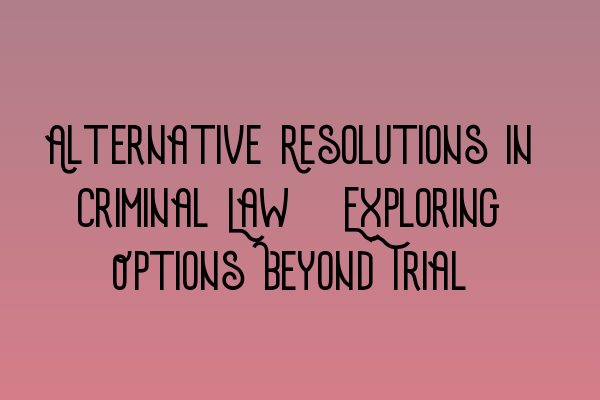Alternative Resolutions in Criminal Law: Exploring Options Beyond Trial
When it comes to criminal law, many people are familiar with the traditional trial process. However, it’s essential to acknowledge that there are alternative resolutions available that can avoid the time and expense of a full trial. In this article, we will delve into these alternative resolutions and explore the options beyond trial.
1. Plea Bargaining
Plea bargaining is one of the most commonly used alternative resolutions in criminal law. It involves negotiations between the defense and prosecution, where the defendant agrees to plead guilty to a lesser charge or accept a reduced sentence in exchange for a guilty plea.
Plea bargaining can be beneficial for both sides as it saves time, resources, and can lead to a quicker resolution. However, it’s crucial to consult with an experienced criminal defense solicitor to ensure that the plea agreement is in your best interest.
2. Diversion Programs
Diversion programs are an excellent alternative resolution for certain types of offenses, especially non-violent and first-time offenses. These programs aim to divert individuals away from the criminal justice system by offering rehabilitation, education, and community service instead of incarceration.
Participating in a diversion program can result in the charges being dropped or reduced upon successful completion of the program. It’s important to note that eligibility for diversion programs varies by jurisdiction, so consulting with a criminal law solicitor is advised.
3. Restorative Justice
Restorative justice is a growing approach in criminal law that focuses on repairing the harm caused by the offense and bringing healing to all parties involved. It emphasizes accountability, dialogue, and resolution rather than punishment.
In restorative justice, victims, offenders, and their respective communities come together to discuss the crime, its impact, and find ways to address the harm caused. This process can lead to healing, redemption, and a sense of closure for all parties involved.
4. Mediation and Arbitration
Mediation and arbitration are dispute resolution processes commonly used in civil law that can also be applied in certain criminal cases. These processes involve a neutral third party facilitating negotiations between the offender and the victim, or in some cases, between the defense and prosecution.
Mediation and arbitration can be effective in resolving conflicts, promoting understanding, and reaching agreements that benefit all parties involved. These alternative resolutions can save time, money, and reduce the adversarial nature of traditional court proceedings.
Conclusion
While the trial process is a cornerstone of the criminal justice system, it’s essential to be aware of the alternative resolutions available in criminal law. Plea bargaining, diversion programs, restorative justice, and mediation/arbitration offer viable options beyond trial that can save time, resources, and promote meaningful resolutions.
Consulting with a knowledgeable criminal defense solicitor is crucial to determine the most appropriate alternative resolution for your case. They can guide you through the process, protect your rights, and help you achieve the best outcome.
Related Articles:
- SQE 1 Practice Exam Questions
- SQE 1 Practice Mocks FLK1 FLK2
- SQE 2 Preparation Courses
- SQE 1 Preparation Courses
- SRA SQE Exam Dates
